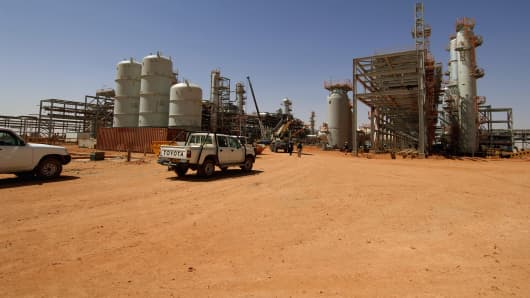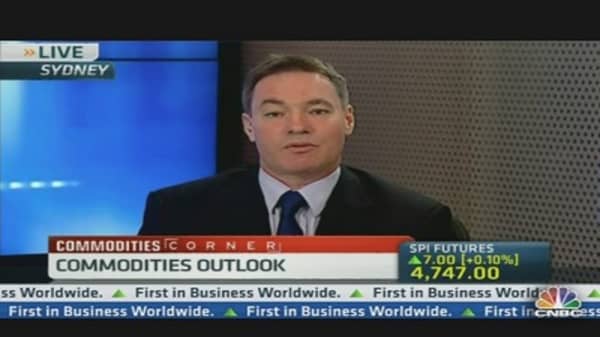"They're numbers that we should probably think about over the next few days," Price told CNBC's "Squawk Box" on Monday. "The issue here is that some people are talking about the cost-push factor because you're going to have to beef up security around the projects that are coming into the market in North and West Africa."
Additionally, there's also the risk that "projects simply won't come to the market that people are expecting," Price said. "That's a supply constraint and that's another support for prices and people will be trying to factor these into the prices over the next few days and weeks and months."
Around 55 percent, or five out of nine of this week's survey respondents, expect prices to gain this week, two said prices may fall while two forecast prices to hold steady.
Oil giant BP may be forced to reconsider further gas exploration in North Africa as a result of the hostage crisis in the natural gas facility that it jointly operates, the Independent on Sunday reported, citing unnamed industry sources.
While it is unlikely that BP will scale back operations in Algeria, further expansion across the region will need careful consideration, owing to the threat from al Qaeda in the Islamic Maghreb, an industry source told the newspaper.
Officially, BP said that it remains committed to Algeria and its "high-quality assets" and intended to return to normal operations there as soon as the circumstances safely allow.
(Read More: IEA Ups Oil Demand Forecast, Warns on Supplies)
Algerian energy minister Youcef Yousfi said the affected plant will resume operations within the next two days. The gas facility - is jointly operated by BP, Norway's Statoil and Algerian state-run energy company Sonatrach - has a production capacity of nine billion cubic meters (318 billion cubic feet) of gas per year, 12 percent of Algeria's output.
Israel Election
Another factor that may potentially influence the political backdrop in the Middle East, and by implication the global oil markets, will be Tuesday's general election in Israel.
Final opinion polls ahead of Tuesday's vote have all predicted Prime Minister Benjamin Netanyahu's hard-line bloc maintaining a solid lead over center-left opponents, the Associated Press reported.
Oil markets will want to know if Netanyahu will sharpen his language in favor of unilateral military action against Iran's nuclear program if he is re-elected.
Netanyahu has welcomed the international pressure on Iran, but he has also repeatedly indicated Israel might attack Iran, alone if necessary, if he concludes that diplomacy has failed, the AP said. Netanyahu has warned that 2013 will be a critical year in determining whether Iran reaches weapons capability or not.
"If Netanyahu gains strength, expect some loud rhetoric in the hopes of forcing a public discussion of Israel and Iran policy at (new Secretary of State John) Kerry's Senate confirmation," said Tom Weber, senior commodity advisor at Portfolio Managers. "Same with Hagel's (Chuck Hagel) confirmation for Secretary of Defense."
Weber, said "upside projections to $100 are not unrealistic" after U.S. crude made a decisive close above $95. Still, has the global economy recovered enough to support $100 oil? "I think not," Weber said. "We'll be long oil until $100 and then reverse to the short side."
From a technical trading perspective, however, Daryl Guppy, CEO of GuppyTraders.com, said the $100 level forms tough resistance and would not be broken this week. A trading range between $78 and $98 a barrel remains in place, Guppy told 'Squawk Box' on Tuesday.
U.S. light, sweet crude settled 7 cents higher at $95.96 a barrel on Friday, taking gains to the week to $2 a barrel. Thursday's session peak of $96.04 was the highest price since September. U.S. crude has risen for straight six weeks. Brent crude futures rose 79 cents to close at $111.89 a barrel, finishing the week higher for the fifth time in six.
China, US Economy in Focus
Improving economic signals in the U.S. and China are building the case for higher prices though the U.S. fiscal challenges threaten to undermine any further risk-on rally.
"Economic data will continue to be closely watched, as investors remain concerned by the state of the fragile global recovery," said Jason Hughes, market strategist at IG Markets in Singapore. "We saw solid data out of China, while not setting the world alight it was good to see solid numbers, suggesting a bottom may have been found for Chinese growth."
He added: "The main focus for all seems to remain as the U.S. debt ceiling, any real developments in the discussions there will certainly guide sentiment for the next week and beyond. On balance, it looks like we are set to move higher on oil once again next week. The recent impressive performance for WTI with 6 weeks of gains and the best run of weekly gains for over a year would point towards us pushing up to $100 a barrel mark."
(Read More: House GOP Debt Ceiling Plan: 'No Budget, No Pay')
That said, IG data show current client positioning suggests a pullback in the recent upwards momentum may be warranted with 64 percent short U.S. crude futures and an almost equal amount, 61 percent, short Brent.
Meanwhile, Compass Global Markets said in its daily report on Monday: "There is no point mincing words...we have been entirely wrong with our view on WTI over the past two months. Whilst we have remained bearish, WTI has had six consecutive weeks of rises. We have been surprised by the performance of the U.S. economy and investors lack of concern over the budget and debt ceiling negotiations. We had expected that equity markets and commodities would have performed not so well given the situation in the U.S. A breach of $97.00 will throw our forecasts out the window."





